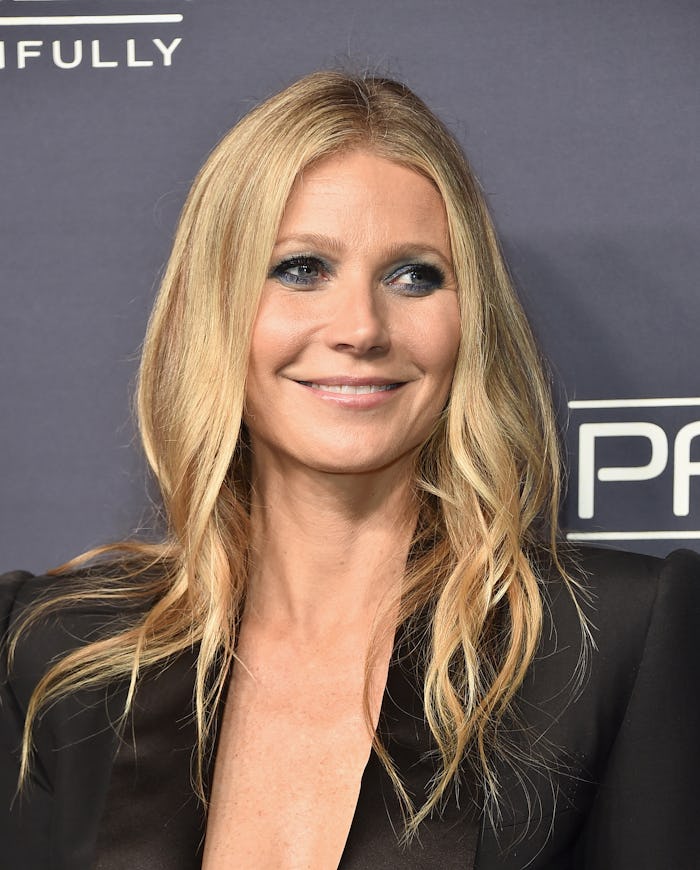Entertainment

Gwyneth Paltrow Opened Up About Her Struggle With Postpartum Depression & It's So Reassuring
Gwyneth Paltrow has made a pretty exceptional career out of her lifestyle. Not just as an actress, but as the brains behind Goop, the wellness lifestyle brand that's so popular it has become its own verb. But that doesn't mean she's above sharing the dark stuff, especially if it helps women deal with their own struggle. So when Paltrow opened up about her postpartum depression 12 years after the fact, it was rather powerful. Because her admission of having come through it herself might help end the stigma if postpartum depression.
Paltrow is the mother of two children with ex-husband, Chris Martin from British band Coldplay, 13-year-old daughter Apple and 12-year-old son Moses. During a special Goop podcast where she spoke with her mother, actress Blythe Danner, Paltrow discussed suffering from postpartum depression when her son Moses was born. And even though a full 12 years have passed since, the Shakespeare In Love actress had no trouble remembering what it felt like to live in "the dark place."
As she explained to Danner, according to People, “I think [it] was really shocking to me because I never thought that I would be a person who got post-natal depression." But that's the thing abut postpartum depression; it can affect any new mom, celebrity or not.
In fact, the Centers for Disease Control and Prevention found that one out of every nine pregnant women experience some form of postpartum depression, and that's an estimate based on new moms who have sought out help. Postpartum depression can present a wide range of symptoms, everything from loss of energy and enthusiasm, feelings of emptiness, trouble sleeping or sleeping too much, difficulty concentrating, and feelings of guilt or worthlessness. It can look different for every mom, and Paltrow was no exception. She told Danner during the Goop podcast that she found it especially difficult to come to terms with postpartum depression because she hadn't experienced it with her daughter, according to People:
I was so euphoric when Apple was born, and I assumed it would happen with Mosey and it just … it took a while. I really went into a dark place.
Paltrow talked about her postpartum depression back in 2015, and admitted that she somehow managed to find a positive take on her situation, as she told Entertainment Tonight:
Luckily, [my case] was low grade enough that I didn't have to be hospitalized, but it's a very debilitating thing, and I think there's so much shame around it and there shouldn't be. It's something that happens, it's something that befalls many women after they have a baby, and for me, it ended up being a wonderful opportunity to explore some underlying issues that I think the depression kind of brought out.
As difficult as it was for her to "wrap her head around," she tried to look at her postpartum depression as an "opportunity," as she told Entertainment Tonight:
So I try to wrap [my head around] the whole thing, and even at the time, it was very difficult to go through, that it was happening. It was in my life for a reason and I tried to use that opportunity to try to really get in there and heal some stuff.
Every time a celebrity mom speaks out about her postpartum depression, I think it chips away a little at the stigma. At this idea that mothers who don't immediately bond with their baby are somehow in the wrong, somehow less. So sure, there will be plenty of detractors out there who might question Paltrow's motive for sharing her struggle, but I honestly don't care about her motive. Here is what is more important: a mom at home, scrolling through the internet. Seeing that shiny, smiling, wonderful Gwyneth Paltrow struggled with postpartum depression and made it through. Maybe heaving a sigh of relief, because she's not alone.
Check out Romper's new video series, Bearing The Motherload, where disagreeing parents from different sides of an issue sit down with a mediator and talk about how to support (and not judge) each other’s parenting perspectives. New episodes air Mondays on Facebook.